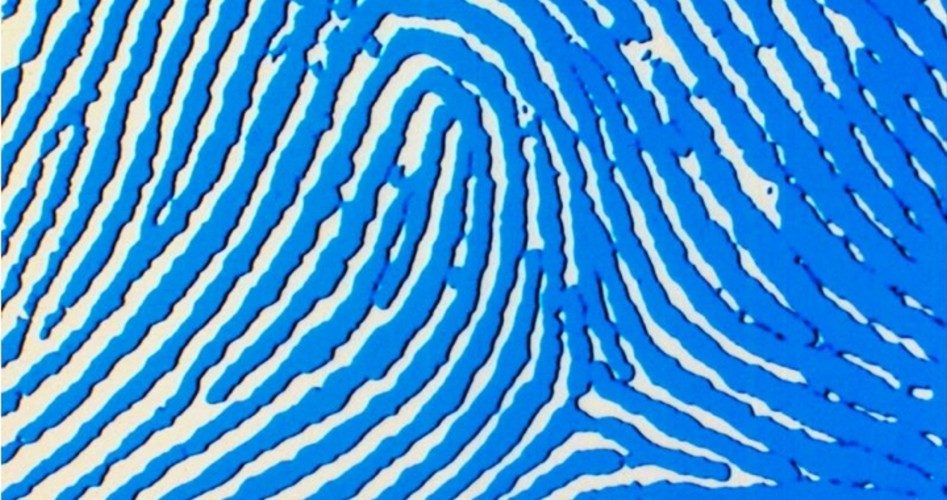
The Federal Bureau of Investigation (FBI) is quietly upgrading its biometrics database to include the fingerprints and photographs of millions of individuals never suspected, let alone convicted, of committing a crime, according to reports from the Electronic Frontier Foundation (EFF).
The civil-liberties group, citing an FBI Privacy Impact Assessment (PIA) from February, finds that the agency now plans to retain indefinitely in its database fingerprints and other biographical information — soon to include photos — submitted as part of routine criminal background checks. These will be merged with data on criminals and criminal suspects. Then, whenever a law-enforcement agency searches the database — EFF says this happens “thousands of times a day” — the fingerprints and other personal data of millions of innocent people will be included in the query.
According to EFF,
This is the first time the FBI has allowed routine criminal searches of its civil fingerprint data. Although employers and certifying agencies have submitted prints to the FBI for decades, the FBI says it rarely retained these non-criminal prints. And even when it did retain prints in the past, they “were not readily accessible or searchable.” Now, not only will these prints — and the biographical data included with them — be available to any law enforcement agent who wants to look for them, they will be searched as a matter of course along with all prints collected for a clearly criminal purpose (like upon arrest or at time of booking).
A significant number of Americans will be affected by this change. Many private employers conduct background checks on prospective employees, although these checks don’t always include fingerprints. Individuals desiring employment in law enforcement usually have to submit to fingerprint checks. Some states require members of various private-sector professions, including child-care workers, engineers, architects, doctors, and attorneys, to undergo fingerprint checks. And all federal employees, from student interns to food-service workers, must undergo the same type of screening.
The fingerprint and biographical data is expected to be stored in the FBI’s Next Generation Identification (NGI) database, which EFF calls “a massive database of personal and biometric information.” NGI will collect and store fingerprints, iris scans, palm prints, voice data, photographs, and any other biometric identifiers the agency desires in the future.
Employers and agencies can already submit photos as part of background checks. As that practice grows, NGI, with its advanced face-recognition capabilities, will become even more powerful.
Furthermore, reports EFF, the FBI is also seeking to obtain software for mobile devices “to collect fingerprints and face images from anyone officers stop on the street” and “search them against” NGI.
No one outside the government knows exactly what the FBI plans to do with the data it collects. The bureau is being typically tight-lipped about the whole thing and hasn’t updated the relevant PIA since 2008, promises to do so notwithstanding. Even a 2014 letter to the attorney general from EFF and 31 other organizations failed to prod the FBI into action.
Still, knowing the government’s desire for total surveillance of the population, EFF speculates that the mobile-device plan “will allow (and in fact, encourage) agents to collect face recognition images out in the field and use these images to populate NGI — something the FBI stated in Congressional testimony it would not do.”
There are clear and present dangers in all of this.
Having all that data about a person in one place makes it far easier for the government to keep tabs on that individual at all times. Indeed, notes EFF, “one of FBI’s stated goals for NGI is to be able to track people as they move from one location to another.” But as EFF declares, “perfect tracking is inimical to a free society. A society in which everyone’s actions are tracked is not, in principle, free. It may be a livable society, but would not be our society.”
The existence of such a massive, centralized database of personal information makes identity theft, blackmail, and other forms of highly personal nastiness far easier and therefore more likely. As EFF points out, “You can’t change your biometric information like you can a unique identifying number such as [a Social Security Number].” Once someone has all this information on a person — and government databases are hardly among the most secure, as recent hacks have demonstrated — it will be nearly impossible for that individual ever to regain his privacy.
Perhaps NGI’s biggest threat to Americans is that they will be falsely accused of crimes. “In 2004,” EFF reminds us, “the FBI mistakenly linked American attorney Brandon Mayfield to a bombing in Madrid based solely on forensic fingerprint evidence. The FBI seized his property, and he was imprisoned for two weeks before agents finally recognized their error and apologized.” Mayfield was lucky; many people are railroaded into huge fines and long prison sentences even when the government knows they’re innocent.
Facial recognition has the potential for even more false matches. A document the Electronic Privacy Information Center pried out of the FBI via a Freedom of Information Act lawsuit revealed that “NGI shall return an incorrect candidate a maximum of 20% of the time.” That could lead to an extraordinary number of false accusations — and not everyone in that situation will be as fortunate as Mayfield.
The expanded NGI is just the latest evidence that Uncle Sam, the relatively benign personification of the U.S. government, is rapidly being replaced by the tyrannical Big Brother. Americans and their elected officials are now faced with this choice: Either put a stop to Washington’s headlong rush toward the surveillance state or learn to love Big Brother. Constitutionalists and other friends of liberty hope they choose the former.



